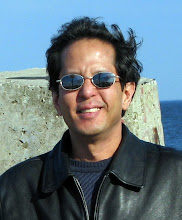 Yesterday Grandpa died. He turned 85 years old 6 days ago on October 17th.
Yesterday Grandpa died. He turned 85 years old 6 days ago on October 17th. The day after my first child, Chloe Frances, was born, 2 weeks ago yesterday (October 8, 1990), Grandpa went into the hospital with pneumonia and a collapsed lung. As I understand it, he was mostly lucid and coherent up until his death, and his condition had stabilized enough to get him released from the hospital last Friday. The prognosis looked good.
Coincidentally, my cousin Fumiya was in New Jersey and New York on business and not only did he get to visit with Chloe and us, but on the way back to Japan he was able to spend a couple of days visiting Grandma and Grandpa. He wasn't aware that Grandpa was sick until we spoke on Friday the 12th, and the following Wednesday he was in Fresno. When we spoke on Wednesday, Fumiya commented on the fact that Grandpa recognized him and seemed to be gaining his strength and clarity.
Dad, in his typical and wearisome impatient and assinine manner, got it in his head a couple of weeks ago to go out to California for a meeting with Moto Nohmura that never took place and to have an unnecessary and premature meeting with AMICUS Communications and Jerry Rosenbloom regarding a contract which was not even under way. All this, of course, at KSA expense -- the corporation formed by Kevin, Mom (holding Dad's stock) and myself. Fateful as it was, he was able to spend last Saturday evening and Sunday with his mom and dad and told me he thought Grandpa would be okay because he had eaten a bit while he was there. He came home yesterday afternoon about 5 P.M. and almost immediately got a call from Grandma that his father had died.
Originally my father was pissed off at me because I had told Grandma that he'd be in California, and this obligated him to visit them, especially since his father was in the hospital. I had even chided him for not wanting to be with his father on his deathbed, assuring him that I would be there for him when he was dying. His immature and typically assinine retort to my comment was, "I don't care if you're there or not." And people wonder why I treat him with such disrespect.
Dad called Uncle Laverne who agreed to preside over the funeral and who agreed to leave immediately to be with Grandma. Uncle Massey, Connie and Raymond will attend but Fumihiko, himself ill in Japan with an ulcer and stomach cancer, cannot attend. There was talk about a great many BCA ministers being contacted to be present at the funeral. And so, the predictions I made some months ago about the passing of my Grandfather are coming true with eerie precision.
Grandma is understandably upset, although this outcome has been long in coming. I guess death is hard to accept no matter how well prepared one is for it. One always clings to hope and life.
It all seems so ironic to me that my child, his great-grandchild, would be born so close to his passing. Chloe will never know her great-grandfather, only see him in family pictures and referred to in our reminiscence. Perhaps if she should read my novel someday in the future, if it's ever completed, she'll get some inkling as to his significance in my life. Perhaps others who have known him will remember him in a light of humanism and dignity. A man's life is, after all, the sum of what he does and says.






